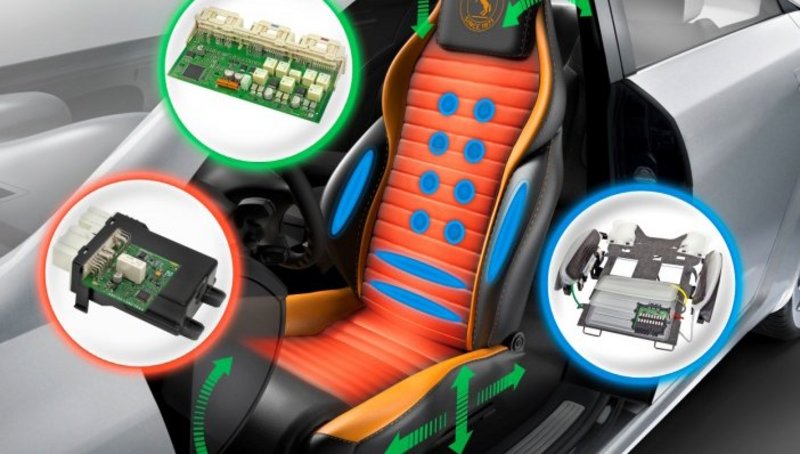Seating Technology from Continental Ensures Comfort and Safety
- State-of-the-art car seats "mold" themselves to the contours of the occupant's body and provide support
- Massage function to promote good health
- Seating comfort is no longer exclusive to premium-class vehicles
Regensburg, September 07, 2015. The seat is where drivers and passengers have most of their contact with a vehicle, which is why it plays such a decisive role in how a car is perceived by the user. Thanks to sophisticated electronic and pneumatic systems, modern-day car seats offer a range of comfort and safety functions. Many of these functions are increasingly finding their way from premium-class vehicles down to more budget vehicle classes. In the future, seats will communicate with drivers as part of a holistic human–machine interface in order to supply key information. At the International Motor Show (IAA) in Frankfurt am Main, the international automotive supplier Continental will demonstrate just how advanced modern seating technology has become.
"Continental makes driving safer and more comfortable, and car seats are already making a considerable contribution here. With our electronic controllers and pneumatics, we are making driving comfortable, relaxed, and safe," says Andreas Wolf, Head of the Continental Body & Security business unit. The company supplies controllers for electrical seat adjustments that personalize seats for the occupants. Memory functions save these seating positions so that they can be retrieved at any time. Seats warming, cooling and ventilation functions also ensure a pleasant in-vehicle climate. More and more safety functions – such as the ability to assume safe seating positions whenever there is a risk of an accident – are also being integrated.
Massage and heat encourages well-being
In addition a diverse range of massage functions help to promote the occupants well-being. Continental utilizes its expertise as a system supplier of pneumatic seats to enable this. Highly dynamic massages during driving promote not only well-being but also health. "A massage program individually tailored to a particular seat occupant's needs is perfectly possible. Overall, in-car health is set to play an increasingly important role in the future," explains Wolf, referring to a related study conducted by the corporate consultants Frost & Sullivan. Continental has laid the technical foundations for this by developing a system in which the cells in the massage mat ensure rapid, air movement and so provide a vitalizing massage. This effect can be enhanced by additional heat supply.
Currently, these kind of sophisticated, comfort-enhancing functions are exclusive to the premium-vehicle sector. The desire for comfort, however, is increasingly influencing buyers of mid-range and compact-class vehicles, too. Thanks to the largely modular design of its systems and intelligent, detailed solutions, Continental is now in a position to offer economically optimized solutions for all vehicle classes. An example: To automatically adjust a seat, its precise position must be known. The sensors required for this are expensive. Thanks to a sophisticated software solution, Continental has found a way around this. Wolf: "Personalized seating comfort is no longer a privilege for premium-class vehicles."
Car seats are capable of so much more
The experts all agree, that there is a high potential for innovation in the development of car seats. An increasingly important aspect, as Andreas Wolf illustrates: "Today, we save our seat settings either in the vehicle or on the vehicle key, which restricts the number of potential users for us. In the era of car-sharing and brand-new mobility concepts, we need new, more personalized solutions such as those that could be potentially offered via our ever-present companion, the smartphone."
The seats can also make an important contribution to automated driving. One of the challenges here is to ensure that drivers are quickly and safely "refamiliarized" with the task of driving following an extended period of automated driving. Different information channels are conceivable, although they are not without risk. Acoustic signals, for example, are of no use to the hearing-impaired, while visual signals force drivers to avert their gaze from the road. In-seat signaling could be the solution here – after all, drivers are always in contact with the seat. A driver could therefore be alerted to particular situations, by a vibrating seat. This is an area that offers huge potential for the seat of the future. As a specialist in surface materials, the Continental subsidiary Benecke-Kaliko supplies the fabric for the seats.
Seating technology for comfort and safety
Seat climatization
- (Incremental) heating of multiple seats or seating areas with just one electronic control unit
- Different temperatures for seat cushions and backrests
- Ventilation of seats to remove moisture
- Active cooling
Seat adjustment
- Seat adjustment on up to 12 axes
- Memory seat adjustment allows seat positions to be saved and retrieved
- Key-specific storage of the driver’s seat position
- Automatic seat adjustment (e.g. when the vehicle is unlocked)
- Anti-pinch protection for selected seat position axes
- Easy entry/exit support
- Default head rest setting
- Automatic adjustment to a safe seat position before a crash
Pneumatic seat system
- Multicontour seat functions in order to adjust the seat to the person's specific posture
- Support for the lumbar region
- Massage function
- Dynamic lateral support (dynamic seat) during cornering maneuvers

Ilona Tzudnowski
Media Spokesperson Software Architecture and Network Solutions
Continental Automotive

